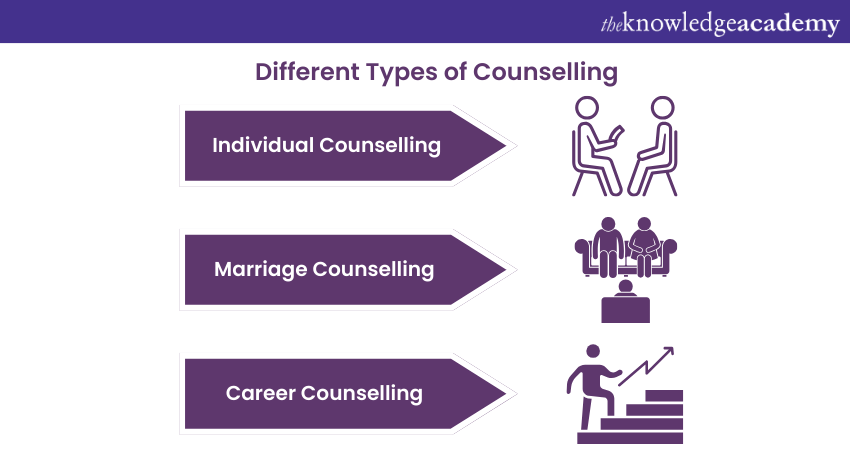relationship therapy: Effective Tips for Healing Conflict
Wiki Article
A Comprehensive Overview to the Numerous Sorts Of Therapy and Their Influence
Therapy encompasses a variety of healing techniques, each created to meet distinct mental health and wellness requirements. From the structured methods of Cognitive-Behavioral Treatment to the compassionate nature of Person-Centered Therapy, these modalities offer distinctive paths to personal growth. Household therapy and Dialectical Habits Treatment give additional frameworks for healing, while group counseling promotes neighborhood assistance. Understanding these diverse approaches can brighten their profound influence on individual well-being. What remains to be discovered are the complexities of each strategy.
Understanding Cognitive-Behavioral Therapy (CBT)
Although many restorative strategies exist, Cognitive-Behavioral Therapy (CBT) attracts attention due to its organized, goal-oriented nature. This form of treatment is based on the property that ideas, sensations, and habits are interconnected, and by changing adverse thought patterns, individuals can change their emotional feedbacks and actions. CBT utilizes various strategies, such as cognitive restructuring, which assists clients recognize and challenge distorted beliefs. Behavior activation urges engagement in pleasurable activities to deal with depression.Commonly, CBT is a temporary treatment, typically long lasting between 12 to 20 sessions, making it obtainable for those seeking quick results. Its efficiency has actually been well-documented in treating anxiety conditions, depression, and other mental health problems. The specialist's duty is to guide customers through workouts and research tasks, cultivating self-awareness and advertising long-lasting coping techniques. This useful technique encourages individuals to take control of their mental wellness, eventually resulting in enhanced life satisfaction.
Discovering Person-Centered Therapy
Person-Centered Treatment, established by Carl Rogers, uses a contrasting approach to Cognitive-Behavioral Therapy by stressing the client's subjective experience. This restorative version focuses on the individual's point of view, cultivating an atmosphere of empathy, genuine favorable respect, and authenticity. By permitting customers to discover their feelings and thoughts without judgment, specialists facilitate individual development and self-discovery.The core tenet of Person-Centered Treatment is the idea that people have the inherent capacity for self-healing and individual advancement. In this setup, the specialist functions as an encouraging overview instead of a regulation authority, urging customers to take charge of their very own trip. This approach is specifically effective for those facing problems such as reduced self-confidence, stress and anxiety, or clinical depression, as it encourages them to face and comprehend their emotions. Eventually, Person-Centered Treatment cultivates a strong healing alliance, fostering trust and openness vital for purposeful adjustment.
The Duty of Household Treatment in Healing
Family members treatment works as an essential part in the recovery procedure for people and their partnerships. This healing technique focuses on enhancing interaction, dealing with conflicts, and promoting much deeper links amongst family members. By attending to dysfunctional characteristics, household therapy encourages each participant to express their ideas and sensations in a secure atmosphere, advertising understanding and empathy.
The effect of household treatment prolongs past the sessions, as enhanced relationships can cause improved emotional well-being for all involved. In general, family treatment plays a vital role in healing by cultivating unity, durability, and common assistance among relative, eventually leading them toward a healthier, a lot more satisfying life together.
Unloading Dialectical Behavior Modification (DBT)
Building on the structure of restorative strategies that enhance psychological health, Dialectical Behavior modification (DBT) offers an organized framework for individuals battling with intense emotions and behavior difficulties. Established by Marsha Linehan, DBT incorporates Website cognitive-behavioral strategies with mindfulness methods, intending to assist clients manage overwhelming feelings and boost interpersonal performance.The treatment is especially valuable for those identified with Borderline Individuality Problem but is additionally appropriate to a variety of various other mental health and wellness issues. couples counselling. DBT contains individual therapy sessions and abilities training teams, concentrating on 4 key capability: mindfulness, distress tolerance, emotion law, and social performance
The Advantages of Team Counselling Sessions
While individual treatment gives important insights, group counseling sessions offer unique benefits that can considerably boost the restorative experience. One important advantage is the feeling of community that emerges amongst participants. Individuals typically discover convenience in sharing their experiences with others encountering similar difficulties, fostering a helpful environment that minimizes sensations of seclusion.Furthermore, group sessions motivate diverse viewpoints, enabling individuals to navigate to these guys find out from each various other's coping strategies and understandings. This cumulative knowledge can cause improved problem-solving capacities and a broader understanding of personal issues.
Furthermore, group counseling frequently promotes liability, as participants motivate one another to seek their goals and abide by their commitments. Lastly, the cost-effectiveness of team therapy makes it an accessible option for many individuals seeking support. On the whole, the collaborative nature of team counseling sessions can considerably improve the restorative journey.
Regularly Asked Concerns
What Certifications Do Therapists Need to Exercise Therapy?
Therapists normally need a pertinent degree in psychology or therapy, in addition to monitored professional experience. In addition, they should obtain proper licensure or certification to exercise lawfully, guaranteeing adherence to professional requirements and moral guidelines.How Do I Choose the Right Kind Of Therapy for Me?
Picking the right kind of therapy involves reviewing individual requirements, discovering numerous techniques, considering therapist specialties, and looking for recommendations. Recognizing specific goals and preferences can considerably boost the effectiveness and contentment of the therapeutic experience.
Are Online Therapy Sessions as Effective as In-Person Ones?
The efficiency of online counseling sessions compared to in-person ones frequently relies on specific choices and conditions. Research study suggests that both approaches can produce favorable end results, though some may locate greater convenience in face-to-face interactions.The Length Of Time Does Counseling Commonly Last?

What Should I Expect During My First Counseling Session?
Throughout the initial therapy session, clients can anticipate an intro, conversation of their worries, facility of objectives, and a review of the counseling process - couples over at this website counselling. This preliminary conference intends to build relationship and assurance comfortReport this wiki page